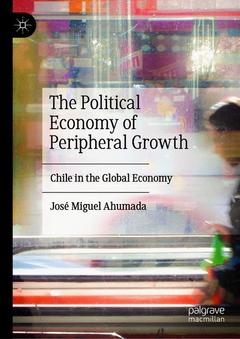Description
The Political Economy of Peripheral Growth, 1st ed. 2019
Chile in the Global Economy
Author: Ahumada José Miguel
Language: English
Subjects for The Political Economy of Peripheral Growth:
Approximative price 105.49 €
In Print (Delivery period: 15 days).
Add to cart253 p. · 14.8x21 cm · Hardback
Description
/li>Contents
/li>Biography
/li>Comment
/li>
This book provides a political economy perspective on Chile?s contemporary economic development, explaining the different stages of Chile?s neoliberal pattern of economic integration into the global economy from 1973 to 2015. Three key explanatory variables are considered: the evolution of business-state relations, US geopolitical interest in the region through the waves of trade agreements, and the political impact of the dynamics of inflows and outflows of financial capital. Although Chile is typically considered to be a successful case of a free market economy, this book presents an alternative narrative of Chile?s growth through using a Latin American Structuralist political economy perspective. While it recognises the positive results in terms of growth, it also emphasises the lack of dynamic sources for long-term development, which embeds the economy into short-term booms followed by periods of stagnation.
Chapter 1. Introduction
PART I. Latin America in the global economy
Chapter 2. The political economy of development and integration: a structuralist perspective
Chapter 3. Latin America since the 1990s: deindustrialization, reprimarization and policy space restrictions
PART II. Chile: The political economy of peripheral growth
Chapter 4. The military dictatorship and the origins of peripheral growth
Chapter 5. The rise and fall of peripheral growth: Chile during the 1990sChapter 6. Chile in the road to the commodity boom: deindustrialization without policy space
Chapter 7. Life after the commodity boom: the structure of contemporary peripheral development (2011 –2015)
Chapter 8. Conclusions: the mirages of the miracle
José Miguel Ahumada is a Teaching Associate at the Department of Politics and Government in the Alberto Hurtado University, Chile. Dr Ahumada’s main research interests are in the areas of political economy of development in Latin America, comparative political economy and the history of economic thought.
Explains the different stages of Chile's neoliberal pattern of economic integration into the global economy from 1973 through 2015
Uses a Latin American Structuralist perspective to discuss Chile's growth
Emphasizes the lack of dynamic sources for long-term development in the Chilean economy




